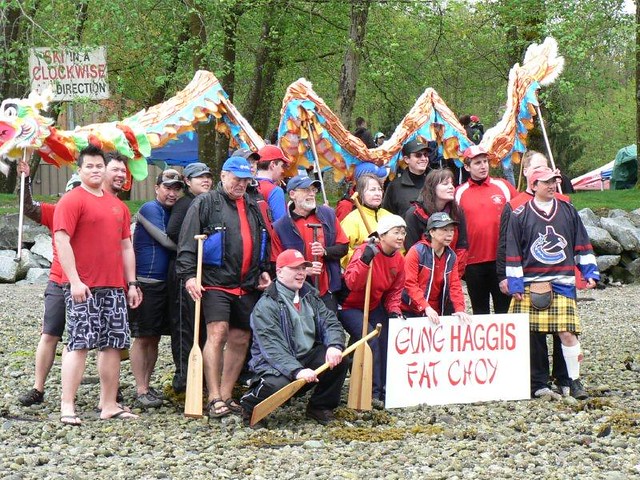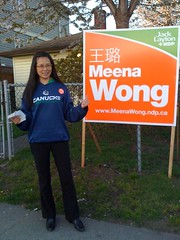To
celebrate its 25th anniversary, the Dr. Sun Yatsen Classical Chinese
Garden held a Founders reception Friday afternoon, and in attendance
were old friends Joe Wai and Marwyn Samuels. Samuels flew in from his
home in China for the event. Wai flew in from his office on Homer
Street.
Two people could not be less alike. Wai is an architect.
Samuels, at present, is a movie producer. Wai was born in Hong Kong and
grew up in Vancouver. Samuels, a Jew who was born in New York, got his
PhD in Chinese Studies at the U. of Washington and came to Vancouver as a
UBC professor in 1974. Wai speaks Cantonese. Samuels speaks Mandarin.
Wai's wife is white. Samuels, in his two marriages, married a Filipina
and a Chinese national. They appear to inhabit two different sides of a
cultural divide, but what those sides are is difficult to say. East and
West are not as twain as they used to be.
In the late 1970s,
events brought Wai and Samuels together. The City of Vancouver had
vacant land at the edge of Chinatown, and wanted to build a park for the
Chinese community. Complicating matters was a bitter political divide
within the Chinese community itself -between a pro-Taiwanese faction and
a pro-mainland China faction.
Samuels was thrust in between the
two. The idea of building a Chinese garden had been suggested, so the
City appointed a three-man advisory committee with one representative
from each faction, and Samuels, who acted as intermediary.
Samuels,
as it turned out, may have been the only person in town to have seen a
classical Chinese garden in situ. He had visited China in 1973 and 1975
on study grants, just as the country was beginning to open up to North
Americans. He made important political contacts while he was there -he
met Premier Zhou Enlai, for one -and it was his idea to have Chinese
artisans build a replica of a Ming Dynasty-era garden here.
“Most
of the existing classical gardens [in China] were built in the 16th
century,” Samuels said, “when China was then part of the global economy.
And most of the gardens were built by very wealthy merchants.”
In
time, Wai, who was vicechairman of the Chinese Cultural Centre, would
be brought on as architect for the park surrounding the garden, and
would also be responsible for adapting the garden's ancient techniques
to modern building codes.
But first they had to get the money to
build it. And it would be built as a symbol between the city's two
communities. “Joe and I,” Samuels said, “decided that this should not be
a Chinese community project, but that it should be a whole community
project, that the Chinese community and non-Chinese community should act
together for the first time on a major project like this, and also that
the city's corporate elite get involved.
“I was always conscious of this cultural mix.”
They needed about $6.7 million. A garden society was formed and a fundraising drive was started.
Then the recession of 1981 hit. The donations dried up.
“But
we weren't about to give up,” Samuels said, “and Joe and I became
allies in this. You know the Yiddish word 'macher'? It's like a fixer.
Essentially, Joe, who had good political connections to the city
government and elite, was the local macher, and I was the China macher.”
At
one point, money was so tight that Li Ka-shing, who was developing land
around the garden, offered to buy it as a centrepiece to his
development. The offer was turned down. At another point, they had to
resort to barter. One corporate donor, a forestry company, sent off a
shipment of raw logs and pulp to China as payment.
They needed
more than just donations from the Chinese community, so Wai worked his
contacts within the non-Chinese community, among them Anne Cherniavsky,
wife of Peter Cherniavsky, head of BC Sugar. Wai and Samuels showed her a
design of the garden, and she brought her friends on board. And Wai won
an important donor in David Lam, former B.C. lieutenant-governor.
Lam
donated $1 million, but only on the condition that it would be the last
million donated. Wai and Samuels first had to prove they could get the
garden built.
“We were really desperate for money at the time,”
Samuels said, “and Joe set up two meetings with Lam. When Lam donated
his own money, his commitment to do that was sufficient to get other
people to come in.”
The society -and both Samuels and Wai stressed
that the garden was due to the hard work of many people -finally raised
most of the money. Fiftythree Chinese master craftsmen flew to
Vancouver and built the garden using traditional methods -no glue, no
screws, no power tools.
Wai would resume his architectural work.
Samuels would move to China in 1994 and marry his second wife, a former
movie actress. They now finance and produce movies together.
Oddly,
both men made a similar observation about the garden and its
relationship to Vancouver's Chinese community. It was the first major
cross-cultural project that the Chinese and non-Chinese communities
endeavoured to build, and as such, had a potent symbolism attached to
it. But in the intervening years, the Chinese community has grown so
different and so quickly that Wai and Samuels wondered at the garden's
relevance to it.
“It seems to me,” Wai said, “that the newer
members of the Chinese community aren't as involved in the garden. As a
community, I don't think we know where we're going.”
“That issue
is quite common in China,” Samuels said. “So much has changed so quickly
there that there is this crisis of identity -who are we and where are
we?” It was wealthy Chinese merchants that built the last classical
Chinese gardens in the 16th century. Now, the wealthy Chinese merchants
of the 21st century were moving here.
A classical Chinese garden
to them, Samuels said, was ancient history. Why, having left it behind,
would they necessarily be interested in it when they came here?
pmcmartin@vancouversun.com










